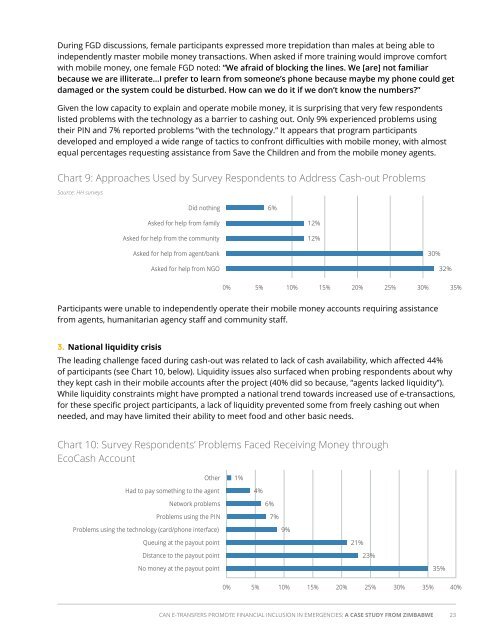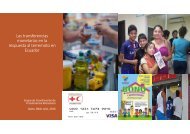Simatelele
2lF850q
2lF850q
You also want an ePaper? Increase the reach of your titles
YUMPU automatically turns print PDFs into web optimized ePapers that Google loves.
During FGD discussions, female participants expressed more trepidation than males at being able to<br />
independently master mobile money transactions. When asked if more training would improve comfort<br />
with mobile money, one female FGD noted: “We afraid of blocking the lines. We [are] not familiar<br />
because we are illiterate…I prefer to learn from someone’s phone because maybe my phone could get<br />
damaged or the system could be disturbed. How can we do it if we don’t know the numbers?”<br />
Given the low capacity to explain and operate mobile money, it is surprising that very few respondents<br />
listed problems with the technology as a barrier to cashing out. Only 9% experienced problems using<br />
their PIN and 7% reported problems “with the technology.” It appears that program participants<br />
developed and employed a wide range of tactics to confront difficulties with mobile money, with almost<br />
equal percentages requesting assistance from Save the Children and from the mobile money agents.<br />
Chart 9: Approaches Used by Survey Respondents to Address Cash-out Problems<br />
Source: HH surveys<br />
Did nothing<br />
6%<br />
Asked for help from family<br />
Asked for help from the community<br />
12%<br />
12%<br />
Asked for help from agent/bank<br />
Asked for help from NGO<br />
30%<br />
32%<br />
0% 5% 10% 15% 20% 25% 30% 35%<br />
Participants were unable to independently operate their mobile money accounts requiring assistance<br />
from agents, humanitarian agency staff and community staff.<br />
3. National liquidity crisis<br />
The leading challenge faced during cash-out was related to lack of cash availability, which affected 44%<br />
of participants (see Chart 10, below). Liquidity issues also surfaced when probing respondents about why<br />
they kept cash in their mobile accounts after the project (40% did so because, “agents lacked liquidity”).<br />
While liquidity constraints might have prompted a national trend towards increased use of e-transactions,<br />
for these specific project participants, a lack of liquidity prevented some from freely cashing out when<br />
needed, and may have limited their ability to meet food and other basic needs.<br />
Chart 10: Survey Respondents’ Problems Faced Receiving Money through<br />
EcoCash Account<br />
Other<br />
1%<br />
Had to pay something to the agent<br />
4%<br />
Network problems<br />
Problems using the PIN<br />
6%<br />
7%<br />
Problems using the technology (card/phone interface)<br />
9%<br />
Queuing at the payout point<br />
Distance to the payout point<br />
21%<br />
23%<br />
No money at the payout point<br />
35%<br />
0% 5% 10% 15% 20% 25% 30% 35% 40%<br />
CAN E-TRANSFERS PROMOTE FINANCIAL INCLUSION IN EMERGENCIES: A CASE STUDY FROM ZIMBABWE 23



